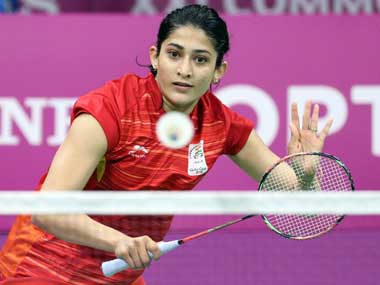
Ashwini Ponnappa is not someone prone to exaggeration. But even she cannot resist being a little dramatic when you ask her how the last few weeks of training have been. “By Thursday, I was dead,” says India’s premier doubles badminton player in a matter-of-fact tone.
When India’s doubles coach Tan Kim Her recently quit, citing personal reasons, the Badminton Association of India rushed to fill the void by roping in the Indonesian duo of Flandy Limpele and Namrih Suroto. Ponnappa calls them “game changers”.
“I think the first week of training was intense. I don’t think anyone was used to that because it has been a while since we had sessions like that. By Thursday, I was dead. But happy, too. At the end of the session, I knew this will help. You know the feeling you get when you do the right thing? We all felt that this is what we need,” says Ponnappa.
The results on court also justified the rigours they were going through in training. At the recently concluded India Open, Ponnappa and N Sikki Reddy knocked out sixth seeds Li Wenmei-Zheng Chen and Xiaofei-Zhou Chaomin.
“I think they (Limpele and Suroto) have a different approach to the game. They are intense. But they are also naturally jovial. As players, we don’t feel like there’s a burden. In fact, we know this is what will make us reach the top level. We embrace the difficult sessions. It’s the right balance between intensity and fun,” says the 2010 CWG gold medallist.
Black box sessions
An unconventional ritual the Indonesian coaches have started in training is something they call ‘black box’ sessions. The players are not informed about the drills in advance. All they have to do is complete the tasks laid down by the coaches on the given day.
“The black box is where you don’t know what’s going to come. Basically, it prepares you mentally for anything. It could be like doing agility drills for 20-25 minutes together or shadow training. It’s the perfect change we needed at the right time,” she says.
Ponnappa and Reddy have been on the wrong side of close three-game defeats on multiple occasions. “But it’s a good thing. We needed rhythm and understanding. After the Rio Olympics, I wasn’t at my best physically and mentally. So, 2018 was a good year. Even though I was training, I wasn’t able to play certain strokes due to pain. When you have dengue, you look normal but you do have internal issues.”
After recovering, the Bengaluru-born shuttler took more time than expected for her to return to a semblance of normality. “I remember once after training I ended up crying. Nothing was working.
I was hitting so hard, I was smashing and there was no power to my strokes. I began to wonder if I would ever get back to my best. Smashing has always been my strongest suit and that worked well when I was playing with Jwala (Gutta). I was starting this new partnership and I wasn’t able to smash, had body aches and I wasn’t ready to start, because physically I wasn’t ready. I got past that one year and a half with support from everywhere and I’m progressing with Sikki,” she says.
After training for nearly three weeks under the new regime, she believes there is a right balance now. “I haven’t been excited about training for a long time to an extent where I feel like a child again.”
Switching to doubles
Doubles has always taken a back seat even among coaches and officials for years in India. It was Ponnappa and Gutta’s gold at the 2010 CWG in New Delhi that rejuvenated the doubles event in the country. Nine years on, though, not much has changed for doubles.
“Jwala and I won gold. Did anyone expect it? No one. The fact that we did well in New Delhi brought us into the limelight. When Jwala did well with Diju, no one really cared. It’s funny how people talk about performances. Do they know that Jwala and Diju were the first ones to play the final of the BWF Super Series?”
Ponnappa also feels let down by comparisons with the singles shuttlers, considering doubles badminton in India does not boast of a rich history. “As a nation, we’ve always looked at doubles as just fun. If singles doesn’t work, switch to doubles. But there are a lot of things that go into being a good doubles player. Everything we’re doing right now is creating history. There’s no past,” explains Ponnappa, who trained in singles badminton until the age of 19.
“It’s the mindset,” she says. “Why would anyone take up doubles? Even if you do well, you don’t get much. Even when you win, you’re not recognised as much. That’s slowly changing. Youngsters are taking up doubles. But everyone wants that individual glory. Individual fame is always better than shared nothing, right?”
source: http://www.firstpost.com / Firstpost / Home> Sports / by Shivam Damohe / April 12th, 2019

